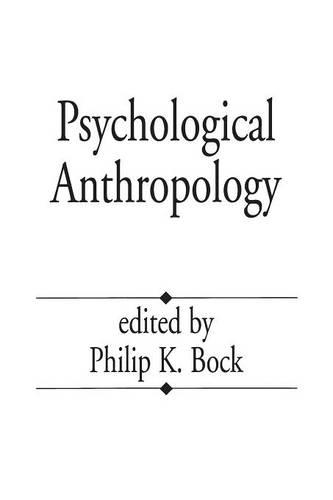
Psychological Anthropology
(Paperback)
Publishing Details
Psychological Anthropology
By (Author) Philip K. Bock
Bloomsbury Publishing PLC
Praeger Publishers Inc
10th October 1994
United States
Classifications
Tertiary Education
Non Fiction
Anthropology
155.8
Physical Properties
Paperback
432
Description
The renewal of interest in psychological anthropology has called for a critical appraisal of past schools and approaches as well as an up-to-date review of the literature and evidence from contemporary research. This handbook draws upon the work of distinguished contributors to examine historical, methodological and critical material related to psyhcological anthropology. The volume is organised in two parts. The first is an historical overview of the field from 1920 to the present, outlining the major schools and approaches that have contributed to psychological anthropology. The second part is a series of chapters on research topics and methods, such as child development, dreams, discourse and the arts, showing the contribution of these topics to our understanding of the relationship between cultural and individual phenomena. The book reflects diverse viewpoints and provides a current treatment of ideas and techniques, critical examinations of research and extensive bibliographic information.
Reviews
This edited volume contains 19 chapters marvelously rich in historic scope, explicative review, systematic analysis and criticism, and, finally, exciting forcasts of what to expect of the often poorly defined field of psychological anthropology.....What impressed me the most about this volume is the matter in which the authors respectfully "objectify" their topics, encircling them for the reader with each of their key principles, methods, and findings....I highly recommend this book. It is both eye-opening and cautious, giving both universalist depictions of nature and humanistic depictions of nurture very close readings from a variety of perspectives, focused on key areas of human functioning.-Book Forum
"This edited volume contains 19 chapters marvelously rich in historic scope, explicative review, systematic analysis and criticism, and, finally, exciting forcasts of what to expect of the often poorly defined field of psychological anthropology.....What impressed me the most about this volume is the matter in which the authors respectfully "objectify" their topics, encircling them for the reader with each of their key principles, methods, and findings....I highly recommend this book. It is both eye-opening and cautious, giving both universalist depictions of nature and humanistic depictions of nurture very close readings from a variety of perspectives, focused on key areas of human functioning."-Book Forum
Author Bio
PHILIP K. BOCK is Professor Emeritus of Anthropology at The University of New Mexico, where he taught for over 30 years./e His fieldwork was in Canada and Mexico. Besides psychological anthropology, he has published on formal theory, ethnomusicology, and Shakespeare. He edits the Journal of Anthropological Research.
